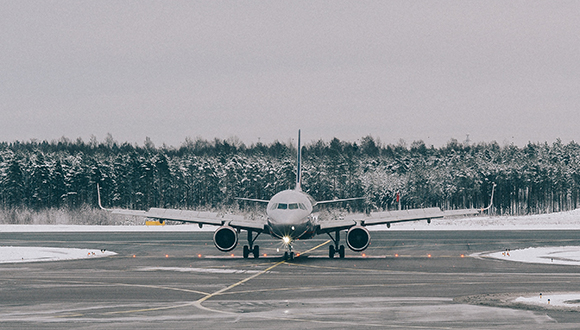Mon, 08 July, 2019
Research into specialised additives to help prevent ice build-up on wind turbines and aircraft, has won one of three runner up places in this year’s Industrial Impact Awards.
Third year PhD student Angelo La Rosa won the award, alongside fellow students Gowtham Soundarapandian and Andrew Sandeman, with Dibakor Boruah scooping first prize.
The awards, organised by NSIRC as part of the Annual Conference, recognise students’ research that makes a significant contribution, or takes an innovative approach, to solve an industrial problem.
Angelo is an NSIRC PhD student with London South Bank University, sponsored by TWI ltd, developing a range of superhydrophobic silica additives, incorporating them into a range of epoxy resins to develop composite components.
PhD Programme based on the needs of industry
The properties of the component are then measured to include their resistance to ice formation. Ice build-up represents a major safety hazard and inconvenience to the aviation industry.
During flight, and at certain altitudes, aircraft encounter supercooled water droplets, which spontaneously freeze on impact.
The resultant build-up increases drag and, in extreme circumstances, may jeopardise the safety of the aircraft.Ice accretion can also occur on large static structures such as electrical power transmission lines and supporting towers, threatening their structural integrity.
Build-up in wind turbine blades increases the load of the blades and the tower structure, leading to high amplitude vibration, turbine fatigue, mass imbalance and structural damage. It’s estimated that ice accretion can reduce the power generation of wind turbines by up to 50%.
Understandably, the industry has made considerable efforts to study the mechanisms of icing and to develop mitigation strategies.
 Specialised additives help to prevent ice build-up on aircraft and wind turbines. Photo: UnSplash
Specialised additives help to prevent ice build-up on aircraft and wind turbines. Photo: UnSplash
Conventional approaches include chemical methods (freezing point depressants), electro-thermal techniques or mechanical approaches to break the ice, however these solutions can be complex, costly to install and present environmental hazards.
Angelo’s research is adopting a passive approach to reduce the ice adhesion or prevent the ice formation in the first place. Aerofoil composites are increasingly being used in the aviation and wind power generation sectors, so by integrating water repellent chemicals onto the surface, it provides additional protection against ice accretion.
Tests show that composites modified with these novel additives display an ice adhesion up to four times lower than unmodified material.
Angelo said "I am so grateful that the Industrial Impact Award committee has recognised all my hard work. I do not deny that it has been a long journey with plenty of obstacles to overcome, but it has been a great opportunity to go out of my comfort zone and improve myself as a person and as a scientist. I would like to thank all the people who helped me to get this award: the NSIRC team for the administrative support, the Functional Coatings and Resins (FCR) team for all the knowledge and experience I have gained in a motivating and friendly environment and my supervisors for their guidance during these three years. I am sure that much more can be done in the future and I would like to continue to contribute to TWI in achieving further goals and objectives."
For more information, or to speak to Angelo about his research, please contact enquiries@nsirc.co.uk.